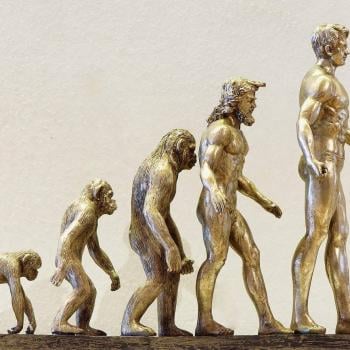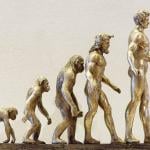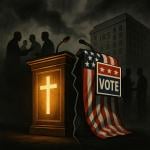DAVID ASKS:
Do you know if it’s true Christian Communion was celebrated during the first moon landing?
THE RELIGION GUY ANSWERS:
Yes. And that Apollo 11 Communion followed a related event on Christmas Eve of 1968 during Apollo 8’s first manned flight to the moon. The earlier flight didn’t attempt a lunar landing but the astronauts transmitted a breathtaking live telecast of moon photographs while in orbit.
Then William Anders, Jim Lovell, and Frank Borman took turns reading the familiar account of God’s creation of the universe and planet Earth from Genesis 1:1-10 in the august King James translation. Commander Borman concluded, “Good night, good luck, a Merry Christmas, and God bless all of you — all of you on the good Earth,” with the last phrase referring back to Scripture’s verse 10. Last year, the 85-year-old Lovell joined a Yuletide re-enactment of the lunar Bible reading at Chicago’s Museum of Science and Industry.
There’s something about such momentous events that makes mere mortals reach for transcendent themes. Think FDR’s D-day radio prayer for God to bless the invading Allied soldiers in their “struggle to preserve our republic, our religion, and our civilization.”
Countless viewers were deeply moved by the Christmas Eve recitation but atheistic activist Madalyn Murray O’Hair was angered. O’Hair had won fame by filing one of two lawsuits through which the U.S. Supreme Court outlawed ceremonial Bible readings in U.S. public schools. After the Apollo 8 Bible incident she filed the “O’Hair v. Paine” federal lawsuit, akin to her earlier school case, accusing the National Aeronautics and Space Administration (NASA) of creating an “establishment of religion” that violated the Constitution.
That dispute played into the Communion during the historic moon landing on July 20, 1969. Astronaut “Buzz” Aldrin wanted the rite to be broadcast to the public but NASA required secrecy due to the legal snarl with O’Hair. Aldrin revealed the Communion in a 1970 article for the inspirational monthly Guideposts: www.guideposts.org/faith/stories-of-faith/guideposts-classics-buzz-aldrin-on-communion-in-space. The story was then picked up by other media.
Aldrin, then a lay elder of Webster (Texas) Presbyterian Church, had discussed ways to mark the lunar landing with his pastor, Dean Woodruff. Aldrin raised the Communion idea and Woodruff checked with Presbyterian headquarters, which said under those unusual circumstances it was proper for a solitary layman to serve himself the elements. (Catholicism allows priests to celebrate Mass by themselves but Protestants always perform sacraments during group worship.) Two Sundays before liftoff, Aldrin received Communion in a private service where Woodruff gave him a second tiny bit of bread and a small silver chalice containing some of the wine that he included with personal items astronauts were allowed to take into space.
The Eagle landed on a Sunday. As colleague Neil Armstrong looked on, Aldrin asked mission control for brief radio silence. Before serving himself the sacred bread and wine he read words of Jesus he had scrawled on a bit of paper: “I am the vine, you are the branches. Whoever remains in me, and I in him, will bear much fruit; for you can do nothing without me” (John 15:5). After worship, Armstrong walked on the moon, followed by Aldrin.
“It was interesting to think that the first liquid ever poured on the moon, and the first food eaten there, were the Christian Communion,” Aldrin observed. “There are many of us in the NASA program who do trust that what we are doing is part of God’s eternal plan for man.” In a later memoir he had second thoughts about commemoration with an explicitly Christian ritual since the landing was a signal event for “all mankind — be they Christians, Jews, Muslims, animists, agnostics, or atheists.” But at the time he could think of no better way to acknowledge the “enormity” of the event “than by giving thanks to God.”
Later in life Aldrin suffered alcohol abuse and clinical depression, and told The New York times that instead of attending church “my Sunday mornings are spent in a recovery meeting.” But his former church in Texas holds a “Lunar Communion” service around each year’s landing anniversary. The service includes a replica of Aldrin’s chalice; the original is preserved in a bank vault.
After Aldrin and Armstrong returned to Earth, legalities continued on both Apollo 8 and the newly added Apollo 11 issue. The U.S. Supreme Court declined to review a federal court ruling that dismissed O’Hair’s complaints. The ruling declared that O’Hair sought “freedom from religion” whereas Aldrin enjoyed personal “freedom of religion” that NASA would have violated if it barred Communion or Bible reading at the astronauts’ own initiative with no government mandate. Thus religious liberty in America’s Bill of Rights was extended into space.
All this brings to mind an odd moment from that astounding July. Like zillions of others, The Religion Guy couldn’t sleep and stayed up half the night watching TV analysis of humanity’s first moon walk. At one point CBS News anchor Walter Cronkite (1916-2009), an Episcopalian, interviewed star (so to speak) science fiction novelist Arthur Clarke (1917-2008), who was an agnostic.
Eventually their chat went something like this: Cronkite: “What do you think will be the long-term effect of the landing?” Clarke: “I believe it will lead to the greatest religious revival in the history of the human race.” Cronkite: “That’s very interesting. And now here’s a word from the Gulf Oil Corporation.” When the ad ended, Clarke had disappeared from the screen and Cronkite never pursued his assertion.












